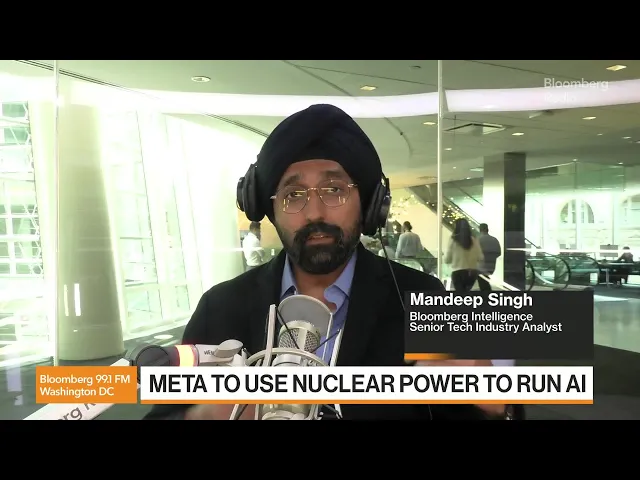Meta to Buy Nuclear Power From Constellation to Run AI

Meta's nuclear pivot powers AI future
In an unexpected but strategic move, Meta has inked a deal with Constellation Energy to purchase nuclear power for its AI operations. This development, announced as part of Meta's broader sustainability initiatives, signals a significant shift in how tech giants are approaching the energy-intensive demands of artificial intelligence infrastructure. As companies race to build AI capabilities, the underlying energy requirements have emerged as both a logistical challenge and an environmental concern that can no longer be ignored.
Key insights from Meta's nuclear power play
- Meta has signed a 20-year agreement to purchase nuclear power from Constellation Energy's Three Mile Island plant in Pennsylvania, specifically to power its AI operations
- The deal represents a major shift in how tech companies are approaching energy sourcing for AI, which requires substantial and consistent power supply
- Meta claims this arrangement will help the company maintain its carbon neutrality commitments while scaling up its AI capabilities
- The partnership includes the reopening of a previously shuttered nuclear facility, creating approximately 275 jobs in the process
- The agreement reflects growing recognition that renewable energy alone may not meet the massive power demands of next-generation AI systems
Why nuclear energy may be AI's perfect power match
The most compelling aspect of Meta's announcement is the recognition that AI's enormous energy requirements demand solutions beyond traditional renewable sources. While solar and wind power have been the darlings of corporate sustainability efforts, they share a critical limitation: intermittency. AI data centers require constant, reliable power at massive scale, creating a fundamental mismatch with weather-dependent energy sources.
Nuclear power solves this problem elegantly. It provides carbon-free baseload power—the consistent electricity generation that forms the foundation of the grid—without the emissions associated with fossil fuels like natural gas or coal. For Meta's AI ambitions, this represents the perfect combination of sustainability credentials and practical utility.
This shift comes amid growing concerns about AI's energy footprint. Recent research suggests that training a single large language model can consume as much electricity as several hundred American households use in a year. As companies like Meta, Google, and Microsoft race to build ever-larger AI systems, their energy consumption threatens to undermine corporate climate commitments unless new approaches are found.
The bigger picture: tech's nuclear renaissance
Meta's nuclear deal isn't happening in isolation. Across the tech industry, we're witnessing a notable
Recent Videos
How To Earn MONEY With Images (No Bullsh*t)
Smart earnings from your image collection In today's digital economy, passive income streams have become increasingly accessible to creators with various skill sets. A recent YouTube video cuts through the hype to explore legitimate ways photographers, designers, and even casual smartphone users can monetize their image collections. The strategies outlined don't rely on unrealistic promises or complicated schemes—instead, they focus on established marketplaces with proven revenue potential for image creators. Key Points Stock photography platforms like Shutterstock, Adobe Stock, and Getty Images remain viable income sources when you understand their specific requirements and optimize your submissions accordingly. Specialized marketplaces focusing...
Oct 3, 2025New SHAPE SHIFTING AI Robot Is Freaking People Out
Liquid robots will change everything In the quiet labs of Carnegie Mellon University, scientists have created something that feels plucked from science fiction—a magnetic slime robot that can transform between liquid and solid states, slipping through tight spaces before reassembling on the other side. This technology, showcased in a recent YouTube video, represents a significant leap beyond traditional robotics into a realm where machines mimic not just animal movements, but their fundamental physical properties. While the internet might be buzzing with dystopian concerns about "shape-shifting terminators," the reality offers far more promising applications that could revolutionize medicine, rescue operations, and...
Oct 3, 2025How To Do Homeless AI Tiktok Trend (Tiktok Homeless AI Tutorial)
AI homeless trend raises ethical concerns In an era where social media trends evolve faster than we can comprehend them, TikTok's "homeless AI" trend has sparked both creative engagement and serious ethical questions. The trend, which involves using AI to transform ordinary photos into images depicting homelessness, has rapidly gained traction across the platform, with creators eagerly jumping on board to showcase their digital transformations. While the technical process is relatively straightforward, the implications of digitally "becoming homeless" for entertainment deserve careful consideration. The video tutorial provides a step-by-step guide on creating these AI-generated images, explaining how users can transform...
